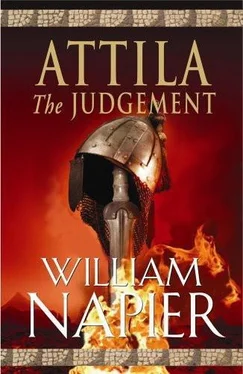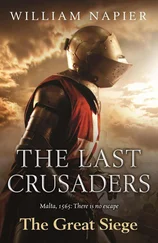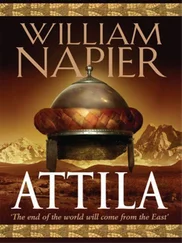William Napier - The Judgement
Здесь есть возможность читать онлайн «William Napier - The Judgement» весь текст электронной книги совершенно бесплатно (целиком полную версию без сокращений). В некоторых случаях можно слушать аудио, скачать через торрент в формате fb2 и присутствует краткое содержание. Жанр: Исторические приключения, на английском языке. Описание произведения, (предисловие) а так же отзывы посетителей доступны на портале библиотеки ЛибКат.
- Название:The Judgement
- Автор:
- Жанр:
- Год:неизвестен
- ISBN:нет данных
- Рейтинг книги:5 / 5. Голосов: 1
-
Избранное:Добавить в избранное
- Отзывы:
-
Ваша оценка:
- 100
- 1
- 2
- 3
- 4
- 5
The Judgement: краткое содержание, описание и аннотация
Предлагаем к чтению аннотацию, описание, краткое содержание или предисловие (зависит от того, что написал сам автор книги «The Judgement»). Если вы не нашли необходимую информацию о книге — напишите в комментариях, мы постараемся отыскать её.
The Judgement — читать онлайн бесплатно полную книгу (весь текст) целиком
Ниже представлен текст книги, разбитый по страницам. Система сохранения места последней прочитанной страницы, позволяет с удобством читать онлайн бесплатно книгу «The Judgement», без необходимости каждый раз заново искать на чём Вы остановились. Поставьте закладку, и сможете в любой момент перейти на страницу, на которой закончили чтение.
Интервал:
Закладка:
He summoned his sons alongside him, and laid his hand on his armoured breast; the princes did likewise. Beneath their bronze cuirasses, father and sons each wore a silver locket containing a single lock of a young girl’s fair, fair hair. They clasped their right hands together. For them, this battle was not about the future of the world.
The sun was rising fast in the eastern sky, flashing on shields and swords. Aetius rode ceaselessly among his lines on his white horse. He gave many curt orders but no great oration. There were multiple motives and loyalties here today – all nations from the Volga to the Atlantic were present. But he spoke to each legion and body of men in turn, and saw resolution in every face.
Across from them, a mile off at most, was the army of Attila. It was impossible to count, but the Romans were probably outnumbered five to one. Yet it was only the second time that Attila had faced a professional army on an open battlefield – and the first time he had faced a commander who knew how to win. Already the Huns, and their less committed followers even more so, were haunted by a deep fear that the might of Rome remained intact, despite all assurances of decadence and decline.
The sun rode higher, the plain burning clear of mist. It was the perfect terrain for the lightning attack of the Hun horsemen with their lethal arrow-storm. But Attila did nothing. He sat his muddy skewbald pony like a stone horseman, staring across at his adversary, the great Master-General Aetius, as he tirelessly worked his lines.
‘Great Tanjou,’ said Chanat, coming alongside him.
Attila did not react for a long time. Then he said something about how even an ancient and ivy-grown castle can still resist attack if its walls are strong.
‘My lord?’
‘But no matter.’ He turned to Chanat and showed his teeth. ‘My guide Enkhtuya has examined the entrails. “Today, the leader of your enemies will die in battle”: there is a simple and straightforward prophecy for you, old Chanat.’ He gazed out over the field again. ‘Aetius’ day is almost ended,’ and he struck his fist upon his saddle so that his horse harrumphed and shifted.
‘Then let us fight, Great Tanjou. It is time.’
Attila nodded. ‘My order is coming.’
‘General Aetius, sir. War-band approaching from the north.’
Aetius sighed. Another little volunteer force to mess up his lines. He could do without them, frankly. He rode around the back of his lines and skirted the hill.
Across the sunlit farmland came a neat column of, at most, two hundred men, spears to the sky. Aetius’ heart stirred, despite his more rational reservations. Two hundred, coming to fight two hundred thousand. Here was valour.
As they drew nearer he saw the leader of the column, a broad-shouldered fellow with a white beard. He gasped.
The leader reined in and nodded. ‘Master-General Aetius of the Romans. Ciddwmtarth of the western Celts and his knights, at your service.’
Aetius tried to speak but could find no words, could only seize Lucius’ arm in its studded leather vambrace.
The old soldier’s eyes twinkled in his lined face to see this famously stern Roman general so moved. He had a heart after all.
‘Gallant little Britain comes riding to rescue all of Europe from the hand of tyranny and the Hun.’ Lucius’ voice was deep and dry indeed.
Aetius spoke with deep sincerity. ‘You are welcome, friend, welcome. You asked for our aid and got none. Now you come riding to our aid unbidden.’ He shook his head.
Lucius said nothing.
‘Are your people safe while you are gone?’
‘There will be more fighting to be done upon our return,’ said Lucius laconically.
Aetius recovered himself. ‘This will not be forgotten.’ He looked at the man riding behind Lucius: perhaps fifty or so but his hair still dark, his face unlined, his brown eyes observing this exchange with quiet attentiveness. ‘And you. You are…?’
The man nodded. ‘My name is Cadoc, son of Ciddwmtarth.’ And he smiled. Yes, fate was strange.
‘To think,’ Aetius murmured, shaking his head again, ‘to think, there were once four boys who played together on a Scythian plain. A Roman and a Hun, and Greek and Celtic slaves.’
‘ Taken for a slave,’ growled Lucius. ‘Not slave-born.’
‘Not slave-born, no. Nobly born,’ said Aetius quickly.
Lucius harrumphed. Cadoc still smiled. Then he said, ‘The sisters who weave the web weave in many tricks and turnarounds. The Greek boy
…’
‘Orestes. He still rides with Attila, too. The Four Boys. Today we are all together again.’
‘To play together on a wide and windy plain, as of old.’
Aetius could feel his eyes begin to swim. How desperately sad was life. Not boyhood: boyhood was sweetly ignorant. But how sad to grow to manhood. He steadied himself by telling them once more that they were most welcome.
Lucius’ only response was to ask where he and his knights should fight. Aetius said that they might choose. He had no jurisdiction over men of such valour.
‘Very well,’ said Lucius, heeling his horse forward. ‘But first we must speak with Attila.’
‘You…?’
Between the astonished lines of the opposing armies, two men rode out from the Roman lines across the divide between them, walking their horses slowly and unhurriedly. One was a fine old fellow with long white hair, wearing a gold fillet, and a middle-aged, mild-looking fellow followed just behind.
Ready to greet them, the Huns drew back their bows.
The old fellow scanned the Hun lines until he saw who he wanted, and rode straight over to him. Hun bowstrings creaked. The Great Tanjou came forward a little on his pony. The pair stopped. Eyes met fearless eyes.
‘I know you,’ said the King of the Huns.
‘Since you were a boy you have known me,’ said the old man, and his voice was strong and bitter and unafraid.
The Great Tanjou glanced at the other man, then back at the leader.
‘Once I saved your life in the backstreets of Rome,’ said Lucius. ‘Once I saved your life in a vineyard. Once I saved your life on a lonely plateau in the mountains of Italy. My men died rather than hand you over to your enemies.’
‘Who turned out to be Romans, too.’
‘Who turned out to be Romans, too,’ the Celt agreed, almost with impatience. ‘Did I save a boy’s life, only to bring all this’ – he waved his arm wide – ‘this destruction down upon the world?’
‘Eternity’s work!’ snarled Attila. ‘Every man has his burden to bear. You have yours. I have mine.’
Lucius’ voice shook with anger. ‘If ever you owed a man anything, you owed your life to me in those days, Attila. No more than a friendless runaway, you were then.’
The king flinched, stormclouds moving over his ravaged face.
Another man approached: the bald-headed Greek. He regarded the two closely, and then a smile flitted over his habitually expressionless features. ‘Well, well,’ he said softly.
‘This battle,’ demanded Lucius roughly. ‘How many men will die? How many widows will you make?’
‘Many tens of thousands!’ cried Attila. ‘Yet still far fewer than the Romans have made in their twelve hundred years of tyranny. You are a fool to be here, old Lucius. This day will be cruel beyond imagining. But I remember you. Stay here and when the battle is concluded, I may reward you with gold – though doubtless you are too noble of soul to be interested in mere gold.’
Lucius did not honour this with a reply.
Attila’s eyes flashed dangerously. ‘Then drop your spears and depart, you and your Celts. No one is interested in you any more, neither I nor Rome. Go back to your miserable, fog-bound island, if you have any sense. You are worthless here. What has your little island kingdom to do with Rome, or Rome with you?’
Читать дальшеИнтервал:
Закладка:
Похожие книги на «The Judgement»
Представляем Вашему вниманию похожие книги на «The Judgement» списком для выбора. Мы отобрали схожую по названию и смыслу литературу в надежде предоставить читателям больше вариантов отыскать новые, интересные, ещё непрочитанные произведения.
Обсуждение, отзывы о книге «The Judgement» и просто собственные мнения читателей. Оставьте ваши комментарии, напишите, что Вы думаете о произведении, его смысле или главных героях. Укажите что конкретно понравилось, а что нет, и почему Вы так считаете.












